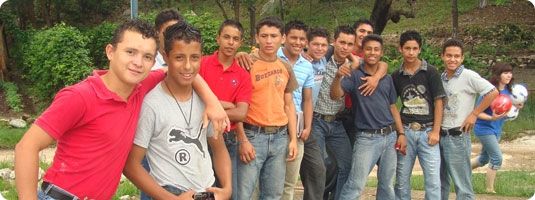Fostering Skills and Strengthening Communities in Honduras

When Emanuel was 15 years old, he started studying at El Hogar Agricultural School, run by the Episcopal Diocese of Honduras. The school is supported by Episcopal Relief & Development.
In his first year, he studied a diverse range of topics, but the following year, he decided to specialize in animal care. “I love working with animals,” Emanuel said. “I would like to be a vet, so I can help animals with more skill.”
Emanuel is one of 200 boys currently being housed, fed and educated by El Hogar. The Agricultural School reaches out to rural families living in poverty by enabling boys and young men to gain an academic and practical background in basic agriculture, with the goal of helping them secure employment upon leaving school. At El Hogar, they learn animal husbandry and crop production, water conservation through the use of drip irrigation, and how to make nutrient-rich fertilizer with animal manure and composted plant matter.
Since Emanuel was interested in animals, he took classes where he learned how to give injections, manage livestock reproduction and attend births, and treat common diseases. As he gains more experience caring for animals, he hopes to find a job and help support his family. “I would like to help my family, because they have been such a help to me,” Emanuel said.
In addition to their coursework, students and graduates of the El Hogar Agricultural School are also involved in community-based programs that allow them to share their acquired knowledge and skills with their families and neighbors. Five projects are currently underway in isolated, rural communities, in order to help people there to plant and cultivate a greater diversity of crops, and market them effectively. Seed money is also being provided to help these communities start fruit plantations and pig farms – something Emanuel is particularly interested in.
Aside from learning important skills, Emanuel has also made friends and grown personally in many ways. “I have learned that I am able to confront the obstacles in my life and continue always forward,” Emanuel said.
Thankful for his education so far through El Hogar, Emanuel plans to continue studying, in order to pursue his dream of becoming a veterinarian.
“Agricultural skills are highly prized in Honduras, where for the most part, people live on what they can grow,” said Matt St. John, Program Officer for Episcopal Relief & Development. “Most people learn traditional techniques from previous generations, but sometimes there are ways to cultivate the land that are better for the environment, like composting instead of slashing and burning.
“Programs like El Hogar take the most up-to-date learning about fertilizers and irrigation systems and make them practical for farmers in rural and impoverished areas. I am glad that Episcopal Relief & Development makes supporting these efforts a priority.”


